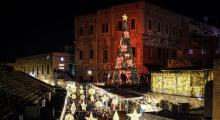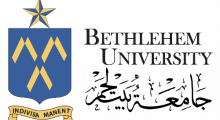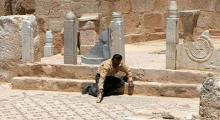Issued by the Catholic Center for Studies and Media - Jordan. Editor-in-chief Fr. Rif'at Bader - موقع أبونا abouna.org

In a controversial move, calls have spread among Christian communities in Palestine (the West Bank) to cancel the Palm Sunday procession, an ancient Christian ritual with roots tracing back to the early centuries in Palestine, specifically Jerusalem. These calls come in the context of the ongoing Israeli war in Gaza and the West Bank, accompanied by several social and political considerations concerning the Christian presence in Holy Land. This raises many questions and concerns given the challenges faced by Palestinian and Eastern Christians.
A Threat to Identity
Palm Sunday is not just a joyful celebration, but a deeply rooted religious ritual within the church’s liturgy. It is celebrated on the Sunday before Holy Week and commemorates Christ’s entry into Jerusalem in a moment of triumph, which paves the way for His passion and redemption. This ritual not only represents the joy of Christians, but also serves as a reminder of suffering and sacrifice for the sake of salvation. Therefore, calls to cancel the "procession" may threaten not only religious practices but the very identity of Palestinian Christians themselves. Given their dwindling numbers and the challenges of their existence within Palestinian society, some may view it as a targeted action amidst the ongoing war and conflict. However, this perspective overlooks the deep historical roots of the Christian heritage in this land of Palestine.
Christ Walks with Us, Not in Church Isolation
Theologically, we cannot discuss Palm Sunday in isolation from the history of Christianity in Jerusalem. The ritual is inextricably linked to Palestine, as Jerusalem was and remains the starting point for everything related to Christianity. Christ’s entry into the Holy City in a procession of victory marked the beginning of His suffering, and churches have continued to commemorate it throughout the ages, from the early centuries to the present day. This "procession" represents the Christians' connection to Palestine as a holy land, an expression of solidarity with Christ in His suffering, and a celebration of the Paschal Feast.
Cancelling this ritual means not only foregoing a popular event but erasing a part of the spiritual heritage that this holy land bears witness to. Since the early Christian centuries, believers have marked Christ’s entry into the city with a public procession from the church to the "place of suffering." This tradition, which has spread from Jerusalem to the Christian world, became a part of Holy Week traditions in all churches.
The Suffering of Christ and the Suffering of Our People
As Father Dr. Aziz Halawa, Director of the Liturgical Office at the Latin Patriarchate of Jerusalem, affirms, the Palm Sunday procession is not merely folkloric; it is an integral part of the liturgical rite for this day. Canceling this ritual would not just be eliminating a popular event, but surrendering a profound worship and spiritual practice. This "procession" is an inseparable part of our spiritual traditions, transcending popular joy to embody deep faith and a strong connection to the Holy Land.
In the context of Palm Sunday, one cannot ignore the profound link between the suffering of Christ and the suffering experienced by Palestinians throughout history. Just as Christ endured persecution for the truth, the Palestinian people today suffer from the same injustice and oppression. Through this occasion, we experience full empathy with the suffering of Christ, who was unjustly persecuted by those who rejected His message, just as Palestinians today are subjected to killing and systematic destruction in an attempt to erase their cultural and religious heritage.
Solidarity does not mean canceling identity
Some voices claim that canceling the Palm Sunday procession could be an expression of solidarity with the martyrs and the wounded in Gaza and the West Bank. However, solidarity does not mean compromising religious and traditional identity. While canceling this ritual may appear to be an act of solidarity, in reality, it is a concession of a fundamental part of our heritage. This religious tradition is not just a celebration of joy; it is part of our history, representing resistance to injustice and victory over oppression, suffering, and death. To disregard it means disregarding a part of our Palestinian Christian identity.
Rising violence against Christians
At a time when Christians in Jerusalem are struggling to revive the Palm Sunday procession, attacks on Christians, churches, and Christian holy sites are increasing. The perpetrators in most cases are young Jewish extremists tied to religious nationalism. In this context, we find that the calls to cancel the Palm Sunday procession coincide—whether intentionally or not—with these attacks, raising questions about the impact this could have on protecting the Palestinian Christian identity and preserving their heritage.
A Collective Responsibility to Protect Heritage
Canceling the Palm Sunday "procession" in Palestine is not merely the removal of a religious ritual; it is an attempt to distance from the historical and cultural roots of Palestinian Christians. It represents a living symbol of our existence in this land. If we begin to accept the idea of canceling these rituals, we may be starting to accept the notion of being separated from this heritage. We must all stand against these calls and hold on to our history, our rituals, and our heritage that ties us to this holy land. Our collective responsibility is to preserve this religious tradition and ensure that Christians in Palestine remain an essential part of the history and community of this land.







